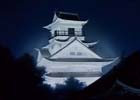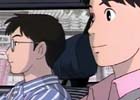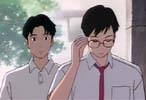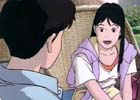Ocean Waves
| Japanese Title: Umi ga Kikoeru | ||
| Also Known As: I Can Hear the Sea | ||
| Genre: Drama/Romance | ||
| Format: 1 Movie | ||
| Allegiance: Studio Ghibli | ||
| Director: Mochizuki Tomomi | ||
| Vintage: 1993 | ||
| Intelligence Agency Report by: Kuzu Ryu Sen | ||
| As Morisaki Taku boards a plane from Tokyo back to his hometown of Kochi, he begins to reminisce about his adolescence – especially his school days. Prolonged contemplation bring Taku’s thoughts about how he met his best friend Matsuno Yutaka as a result of a cancelled class trip, and about how his idyllic country life changed forever when Yutaka introduced him to a new transfer student from Tokyo. | ||
|
|
||
| Field Agent Report by: Kuzu Ryu Sen | ||
| Plot Characters Impact Visual Audio |
8.50 8.25 9.00 9.00 8.00 |
|
| Overall | 8.75 | |
| (not an average) | ||
While the opening frames of Ocean Waves read “Studio Ghibli,” make no mistake, this is unlike any Studio Ghibli film made prior or made since. Rather than a theatrical release, Ocean Waves was made for broadcast on television. Rather than the detailed and elaborate approach that is a Studio Ghibli trademark, the objective here was to produce quickly, cheaply, and efficiently. Finally, rather than Miyazaki Hayao or Takahata Isao, Ocean Waves was directed by someone with no prior connection to the studio: Mochizuki Tomomi (Kimagure Orange Road: I Want to Return to that Day, Here is Greenwood).
Yet, the end product of all these changes is not that far in terms of quality from the rest of Studio Ghibli’s portfolio. The artwork is breathtaking, using subtlety to expertly bring out the small town charm of Kochi. Backgrounds are picturesque, animation is detailed, crisp, and clean, and visual effects are masterfully utilized to accentuate mood. Of particular notice is the exquisite attention to realism, much in the veins of Takahata Isao’s style.
That having been said, there are also distinct elements of Director Mochizuki’s style incorporated into the film. First off, the soundtrack is very similar to that of his other works – a more playful and adventurous soundtrack that is a departure from the smooth orchestral pieces normally associated with Studio Ghibli. Second, the cast interaction is much more subtle and much less straightforward than the standard Ghibli work. In Ocean Waves, characters – for the most part – reveal their personalities through verbal jousting or playful teasing rather than through plot events.
This fusion of Mochizuki with classic Ghibli results in what, for the most part, would be a masterpiece of storytelling… except for one serious problem: an overabundance of source material. With so much to say and so little time to say it, the audience is really only treated to the affairs of the three main characters, and even their progress feels rushed at times. As a consequence, the emotions behind the ending have a bit of a deus ex machina feel to them.
Nonetheless, Ocean Waves is a very special work, and certainly not the black sheep of Studio Ghibli in any way. Let’s see: spectacular graphics, check; interesting characters, check; intriguing plot, check; and most importantly, fantastic atmosphere, check. It’s the type of film where you can just sit back and let the sounds of the ocean carry you away.




